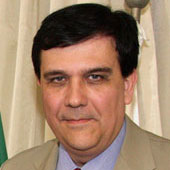Brazil’s Strategy for Economic and Social Sustainability
Is there always a trade-off between doing what’s best for the global environment and doing what’s best for the domestic economy?
November 30, 2012

In Brazil, the mood is very different from Europe. We don’t have a recession, we have mild growth. Of course, we don’t have the same high standards of living as either Europe or the United States.
But the crucial thing we have learned over the last 25 years of managing our economy — and especially from the periods when we mismanaged it — is this: Whenever you don’t face up to the problems you have, they will end up bigger than they are.
For many years, we made the political decision to avoid the issue of public deficits. And so we had a series of hyperinflations — not one bout with it, but an entire series. This, of course, halted the growth of our country.
That was a hard lesson. The first thing the new president, Dilma Rousseff, upon being inaugurated in January 2011 was to rein in fiscal expenditures. This, of course, coincided with a global economic slump. It is therefore no surprise that Brazil’s growth slowed from 7.5% to around 2.5% to 3%.
Our new president has also come under pressure from some of her own party’s core constituencies — in particular, public-sector unions — to raise wages well in excess of current inflation. President Rousseff could have taken the easy path and said, “Well, let me raise wages by 5%, 7% or even 10%, while inflation is 4%.”
One might have expected her to give in to that demand — she is a socialist, after all. But she did not do that. She resisted.
The impression that I get from what is happening in some other parts of the world is that political leaders do not have the courage to resist the excessive demands of the public sector. It is conveniently forgotten that someone always has to pay the bills.
The European Union started out with countries that had very good credit positions and that could raise debt quite easily in the markets. Now, Europe faces a crisis whose root is not only financial, but concerns the ability to compete.
There are clear downsides to the European consensus that growth shouldn’t be measured just in terms of increases in GDP. One also has to be aware that if GDP basically “grows” at 0% for ten years, while other parts of the world are experiencing 5% or 9% growth in GDP, then one will become increasingly irrelevant.
This is a very basic but often forgotten point about the direct linkages of fiscal discipline, economic performance, and a society’s long-term future. He who seeks to avoid facing the hard choices will have to face even harder, even less pleasant choices down the road.
We in Brazil have accumulated too much experience of seeking to avoid many hard choices. If there is one positive aspect of this, however, it is that we now have a surprisingly broad-based consensus that we should no longer engage in such short-sighted and ultimately self-defeating strategies.
At the present time, we are halfway between making most of the hard choices we need to make — and not doing so. Of course, an inclination to make half-decisions is the nature of things everywhere. We try to avoid the worst scenarios and then play according to those constraints.
But the important matter is that we have to be ready to discuss the consequences of our partial inaction. If we do not do so, then things can become unmanageable quickly.
This is especially true when it comes to matters such as the environment, trade (including protectionism), monetary policy, income distribution and access to energy.
On each of these big agenda items, we are dealing with a dynamic process. We will have to choose between short-term and the long-term goals. Ultimately, the nature of politicians and the citizenry alike is to try and delay those decisions.
The political and economic reality, especially in an integrating world economy, is if you don’t make your choices, they will be made for you. They will arrive at your doorstep whether you want them to or not.
The dynamic nature of this process is very interesting. You may be a loser in the short run, and you may be winning in the long run. There is a problem of credibility in the game.
But if we have processes that entail faith and credibility among players, it is much easier. If we don’t have those, it will be much more difficult.
What is even more interesting with regard to this dynamic process is that the domestic inclination to procrastinate may be dealt with by virtue of the fact that the process is ever more international in character.
Take the issue of the environment. No doubt we are facing a very difficult situation. The evidence is indisputable that we cannot proceed for another 20 years doing what we have been doing — unless we want to really compromise the world for the rest of time.
The choice we face is between gambling our very existence on living in a world under climactic conditions that we have never known or not. The rational choice would be not to do that.
On the other hand, given the very strong geopolitical competition that is going on for access of markets and access to natural resources, we are inclined not to devote any resources to anything but making gains in those arenas.
Someone has to start playing the card of comparative gain rather than playing the card of non-cooperation. Other nations have to join this game and realize that this non-maximization is the best path.
We have to be smart enough to think of what could happen to the world a few years from now if we don’t change course. Are we going to continue on a path the consequences of which are going to be very difficult to repair within ten years?
In my view, the best approach is to focus on two or three topics that represent the most important constraints on everyone, whether it is trade, labor mobility, technology transfer or the protection of our environment.
If at least we could do that, much would be gained. Solutions, preferably market-based, will come soon afterwards. To be sure, each region and each country will have its own solutions according to its own politics, but the world as a whole will become more maneuverable.
The way in which we are currently trying to proceed — by trying to interact on everything — is bound to make progress on anything impossible.
The biggest price of entry to the global game, though, may be just this: That only those countries that are laying the groundwork for global cooperation and progress at home are making a positive contribution to solving the problems at hand.
The reason why they would be willing to do this is not to make any concessions to other nations, but to improve their own lot, their national standard of living, as measured in terms of quality of life.
Measured against that mark, we Brazilians feel that we are moving in the right direction and are making a positive global contribution. We have learned the core lesson from our not-so-distant past.
The border between being lax on dealing with pressing realities and falling into the trap of self-delusion is very thin.
Editor’s note: This essay was adapted from the author’s presentation at the 2012 Salzburg Trilogue. Hosted by the Bertelsmann Stiftung in Germany, the Salzburg Trilogue facilitates international cultural dialogue by bringing together recognized public figures to consider matters of global importance.
Takeaways
Only those countries that are laying the groundwork for global cooperation at home are making a positive contribution to solving the problems at hand.
What is happening in some other parts of the world is that political leaders do not have the courage to resist the excessive demands of the public sector.
Given the strong competition for access of markets and natural resources, we are inclined not to devote resources to anything but making gains in those arenas.
Each region and each country will have its own solutions according to its own politics, but the world as a whole will become more maneuverable.
